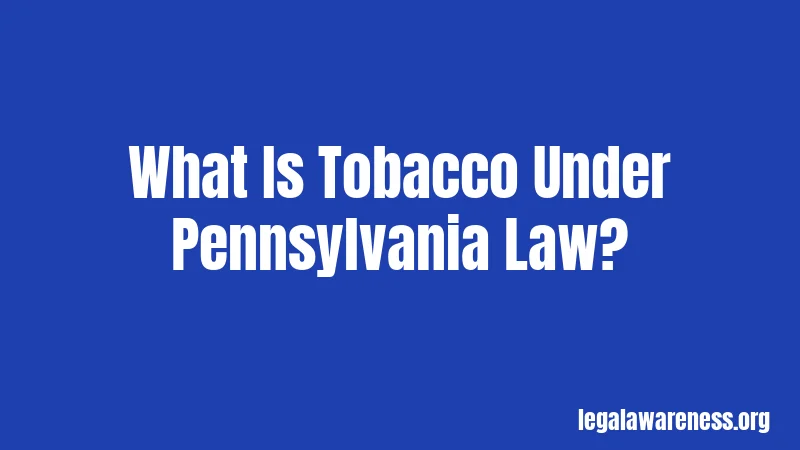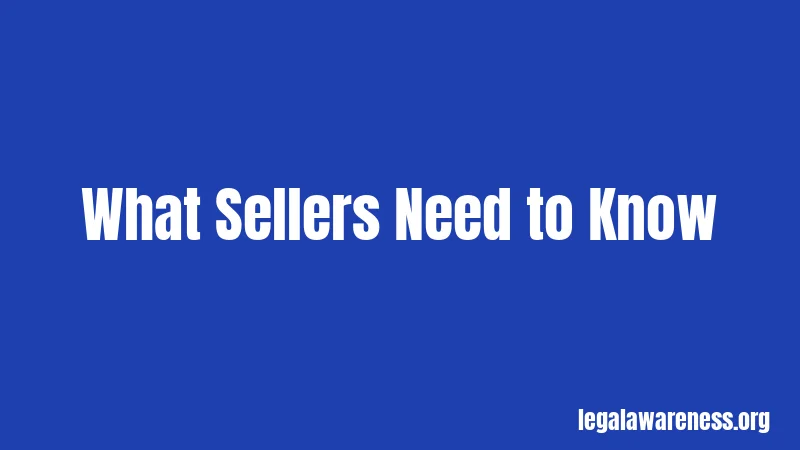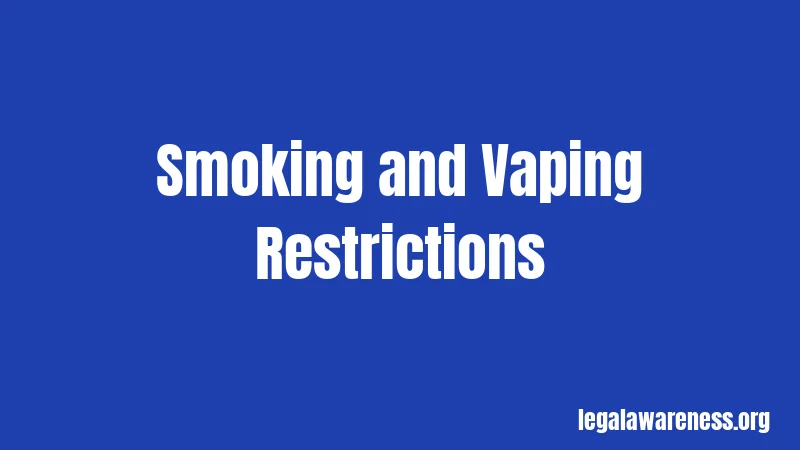Pennsylvania Tobacco Laws in 2026: Rules That Might Surprise You
Most people think tobacco laws are simple. Buy it, use it, done. But Pennsylvania has some serious rules you need to know about. Getting caught breaking these laws can mean hefty fines, criminal charges, or even jail time. Let’s break down exactly what’s legal and what isn’t in Pennsylvania.
Here’s the thing: these laws change. Pennsylvania updates its tobacco regulations regularly. What was legal five years ago might not be today. That’s why understanding the current rules matters so much.
What Is Tobacco Under Pennsylvania Law?

Okay, let’s start with the basics. Tobacco includes cigarettes, cigars, pipe tobacco, and smokeless tobacco. Pennsylvania also covers newer products like electronic cigarettes and vaping devices. Pretty much anything nicotine-related falls under these laws.
Pennsylvania treats different tobacco products differently. Cigarettes have strict age limits. Cigars have their own rules. E-cigarettes? Those are regulated too. That’s the confusing part for a lot of people.
Age Requirements for Tobacco
Here’s where it gets serious. You must be 21 years old to buy tobacco in Pennsylvania. This applies to all tobacco products. Cigarettes, cigars, chewing tobacco, vape products. All of it requires you to be 21 or older.
This law is strict. Really strict. Retailers scan IDs for a reason. Selling to anyone under 21 is illegal, and sellers face major penalties.
Want to know something that surprises people? It’s illegal for adults to give tobacco to minors. Even if you’re a parent, you can’t give cigarettes to your 18-year-old kid. The law doesn’t make exceptions for family members.
What Sellers Need to Know

Are you thinking about selling tobacco products? Stay with me here. The rules are specific.
Retailers must check ID for anyone who looks under 27. This is called “age of majority plus 5.” If someone looks young, you check. No exceptions. If you don’t check, that’s your liability.
All tobacco products must have health warnings on the packaging. Cigarettes need specific warning labels. E-cigarettes need labels too. These aren’t suggestions. They’re legal requirements.
Here’s something many people miss: retailers can’t display tobacco products where kids can see them easily. Products must be behind the counter or in restricted areas. You can’t have cigarettes sitting on open shelves at eye level for children. Pretty straightforward, right?
Licensing and Registration
Not sure if you need a tobacco license? Here’s the answer: yes, you do. Every retailer selling tobacco needs a license from the Pennsylvania Department of Revenue.
Getting a license isn’t complicated. It requires an application and a fee. You’ll need to prove you’re a legitimate business. Once you have it, you need to keep it updated. Licenses must be renewed, and the state tracks this carefully.
Selling without a license is a crime. We’re talking potential fines and criminal charges. It’s not worth the risk.
Smoking and Vaping Restrictions

Now let’s talk about where you can and can’t smoke. Pennsylvania has a Clean Indoor Air Act. This law limits where people can use tobacco products.
You can’t smoke in most indoor public places. This includes restaurants, bars, and workplaces. Even though some states let bars allow smoking, Pennsylvania doesn’t. The law is broad and covers most indoor areas where people gather.
Vaping has similar restrictions. E-cigarettes are treated like traditional cigarettes in public places. Many restaurants and businesses ban vaping indoors, just like smoking. Some places are stricter than others, so check before you vape.
Wondering about your car? There’s no statewide law against smoking in vehicles. However, local municipalities can set their own rules. Some towns restrict smoking in cars with children. Always check local ordinances.
Here’s something that matters: secondhand smoke protections keep growing. More workplaces are going smoke-free. More apartments prohibit smoking. The trend is toward stricter rules, not looser ones.
Penalties for Age Violations
Let’s get specific about what happens when someone breaks the age law.
If you’re under 21 and caught with tobacco, you face a fine. First offense? Usually around $50 to $100. But it goes up fast. A second violation can be $200 or more.
For sellers, the penalties are way harsher. Selling to a minor is a serious offense. You’re looking at fines that can reach $500 or more per violation. Repeat violations mean higher penalties.
Here’s where it gets worse: you can face criminal charges. This isn’t just a civil fine. Criminal convictions appear on your record. For retailers, a serious violation could mean losing your tobacco license permanently.
Think of it like this: selling tobacco to a minor might seem like a small thing, but the law treats it seriously. The state wants to prevent youth tobacco use, and the penalties back that up.
Electronic Cigarettes and Vaping
Let’s talk about e-cigarettes. Honestly, this is where people get confused most often.
E-cigarettes are regulated like traditional tobacco products in Pennsylvania. They require an ID check. No one under 21 can buy them. The age restriction applies the same way.
But here’s something important: the ingredients in vaping liquids matter. E-liquid can’t contain certain chemicals. The state monitors what’s in these products. Some flavored vaping products have restrictions. Menthol e-cigarettes, for example, face regulations that traditional menthol cigarettes don’t.
Vape shops must follow the same licensing rules as tobacco retailers. They need approval from the state. They must check IDs. They must keep records. Don’t assume vape shops are different. They’re held to similar standards.
Smokeless Tobacco Rules
Chewing tobacco, snuff, and other smokeless products have their own regulations. You must be 21 to buy them. Retailers must check ID. The same penalties apply for selling to minors.
Many schools and public buildings ban smokeless tobacco use indoors. Just because you’re not smoking doesn’t mean you can use it anywhere. Check the specific rules for your location.
One thing surprises people: smokeless tobacco still has nicotine. It’s still addictive. It still requires the same age verification as cigarettes. The “smokeless” part doesn’t make it less regulated.
Taxation on Tobacco
Pennsylvania taxes tobacco products. This is important because it affects the price. Cigarettes have an excise tax. The state tracks this carefully.
Tax rates can change. The state adjusts them periodically. This means cigarette prices go up sometimes. You need to check current prices if you sell tobacco.
Not paying tobacco taxes is a serious crime. Selling untaxed tobacco is illegal. If you’re a retailer, you must collect and remit taxes correctly. Messing this up can result in criminal charges and civil penalties.
Local Laws and Ordinances
Here’s something crucial: Pennsylvania isn’t the only authority. Cities and towns can make their own rules too.
Some municipalities have stricter smoking bans. Some cities restrict where you can smoke more than the state law does. Philadelphia has its own tobacco regulations. Pittsburgh has different rules. You need to check your local area.
Some towns ban outdoor smoking in certain areas. Parks, bus stops, and other public spaces might have local restrictions. What’s legal in one city might be illegal in another. Always verify local laws.
Recent Changes and Updates
Pennsylvania updated its tobacco laws in recent years. The age restriction to 21 was a major change. Before that, it was 18. This happened in 2020 federally, and Pennsylvania follows that standard now.
E-cigarette regulations have evolved too. As vaping became more popular, Pennsylvania tightened rules. Flavored vaping products got more restrictions. The state continues to monitor these products.
Stay informed about changes. Laws are updated regularly. What’s true today might change next year. Check official sources every few years to stay current.
Youth Tobacco Prevention
Wait, this part is important. Pennsylvania takes youth tobacco use seriously.
The state runs education programs about tobacco dangers. Schools teach about nicotine addiction. The goal is preventing young people from starting. This shapes the laws you just read about.
The penalties for selling to minors are harsh for a reason. The state wants to keep tobacco away from kids. Every violation makes it harder for retailers to continue operating.
If you’re a young person, know this: nicotine addiction is real. It’s serious. Vaping might seem safer than smoking, but it’s still addictive. Many young people think they can quit anytime. That’s not how nicotine works.
How to Stay Compliant
So what do you do if you sell tobacco? Here’s your roadmap.
First, get your license. Apply to the Pennsylvania Department of Revenue. Get the necessary approvals. Keep your license current. This is step one, and it’s non-negotiable.
Second, always check ID. No exceptions. If someone looks young, scan their ID. Train your staff on this. Make it standard procedure. This simple step prevents most problems.
Third, keep records. Track your sales. Keep receipts. Document everything. If there’s ever an audit, you’ll be protected.
Fourth, monitor your local laws. Don’t assume state law covers everything. Check your city or town rules. Stay updated on any changes. Local authorities can add restrictions anytime.
Fifth, educate yourself. Read the regulations. Understand what’s legal and what isn’t. If you’re unsure about something, ask a lawyer or contact the Department of Revenue.
Resources for More Information
You need trusted sources for tobacco law information.
The Pennsylvania Department of Revenue has official information about tobacco regulations. Visit their website for current rules and licensing details.
The state legislature website has all tobacco laws written out. You can read the actual statutes if you want the legal details.
Local health departments often have fact sheets about tobacco laws in your area. They can tell you about both state and local restrictions.
If you’re serious about compliance, talk to a lawyer. A lawyer who knows Pennsylvania tobacco law can give you specific guidance for your situation.
Frequently Asked Questions
Can I smoke in a bar in Pennsylvania? No. Pennsylvania’s Clean Indoor Air Act bans smoking in bars, restaurants, and other indoor public places. Some bars have outdoor smoking areas, but indoor smoking isn’t allowed.
What’s the penalty for a minor possessing tobacco? A first offense is typically a $50 to $100 fine. Second and subsequent violations cost more. You could also face community service or other penalties depending on your local judge.
Can parents give tobacco to their children? No. It’s illegal for anyone, including parents, to give tobacco to someone under 21. The law doesn’t make exceptions for family members.
Do e-cigarettes require age verification like regular cigarettes? Yes. E-cigarettes are regulated the same way. You must be 21 to buy them, and retailers must check ID just like with traditional cigarettes.
What happens if a retailer sells tobacco to a minor? The seller faces serious penalties including fines up to $500 or more per violation. Repeat violations can lead to license suspension or revocation. Criminal charges are possible.
Are there any tobacco products exempt from age restrictions? No. All tobacco products, including cigars, pipe tobacco, smokeless tobacco, and e-cigarettes, require age verification. There are no exemptions.
Can I use smokeless tobacco anywhere in Pennsylvania? Not necessarily. Many public buildings ban it. Schools prohibit it. Workplaces often ban it too. Check the specific rules for where you want to use it.
How often do I need to renew my tobacco retailer license? License renewal requirements vary. Contact the Pennsylvania Department of Revenue for specific details about your situation. Missing renewal deadlines can result in losing your license.
Final Thoughts
Pennsylvania’s tobacco laws are strict. They’re also specific. Now you know the main rules and why they exist.
The age restriction to 21 applies to everything. The penalties for breaking it are serious. Local laws can be stricter than state law. E-cigarettes and smokeless tobacco follow the same rules as cigarettes.
If you’re buying tobacco, bring an ID. If you’re selling it, get a license and check IDs carefully. If you’re a young person, understand that nicotine addiction is real and powerful.
Stay informed. Laws change. When in doubt, check official sources or talk to a lawyer. Your knowledge protects you and keeps you on the right side of the law.
References
Pennsylvania Tobacco Tax – Department of Revenue
Pennsylvania Tobacco Control Program – PA Department of Health
Pennsylvania Clean Indoor Air Act – State Legislature
